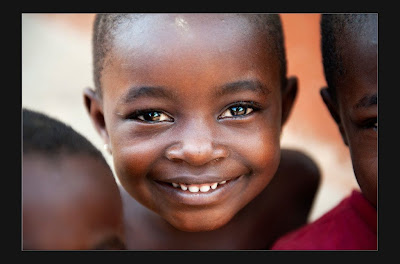Recess is in full swing at Anglican Primary School in Humjibre, and the
girls playing "ampe" have picked up the pace. The leader sets the rhythm, jumping on the beat and clapping. On the
third beat she suddenly sticks out a leg, which must be matched by the
follower. This game, called "ampe," is hugely popular among girls in
Humjibre. It resembles a full-body, dancing version of
rock‒paper‒scissors, or a game of odds and evens. One partner wins a point if
both of them stick out the same leg, while the other gets a point if
their legs mirror one another. The game speeds up again, and the
follower has to guess which leg the leader will stick out. It’s
impressive how synced their rhythms become, and it's clear the game
requires, and builds, a great sense of rhythm and timing.
It should come as no surprise that play is crucial to children’s overall development, and it helps fulfil many of their needs. Any teacher or parent can tell you how much energy young kids can have, and play is not only an outlet for this seemingly endless energy, but is also a way for children to learn by using all of their senses.
In her book, “A Running Start”, Rae Pica describes how children retain more information the more senses they use in their play-time. Free play helps to develop children’s ability to communicate with one another by expanding their language skills and encouraging cooperation. It enables them to express themselves to their peers and, in turn, to establish their own sense of self in relation to others.
Play gives kids the chance to release their anxiety while learning how to deal with stress. It is also a way for children to develop their cognitive abilities in a hands-on way, honing the sensorimotor skills that they will use for a variety of purposes throughout their lives.

Playing outdoors gives children the opportunity to burn off some of that excess energy, and at the same time also exposes them to the world around them. Outdoor play encourages kids to engage with their environment, which in turn piques their curiosity about the world that surrounds them.
The girls here also really enjoy playing jump rope, with two girls swinging the rope while participants line up for their turn. The girls often set up more than one jump rope station, and it seems to be based on difficulty level, with the smaller children jumping at an easier pace and the older girls skipping competitively at a feverish rate. Although this game is female dominated, some small boys are eager to line up for their turn as well.

 Meanwhile, most boys have thrown themselves into a boisterous football (soccer) match, and can be seen racing around after the ball in large groups throughout their whole recess times. Two sticks held up with piles of stones serve as their goals, and it appears that no number of players is too many. Thirty lads can be playing in one game and several pick-up matches take place around the schoolyard at once. The girls don't seemed to be prevented from playing with the boys. They are just more interested in their own games.
Meanwhile, most boys have thrown themselves into a boisterous football (soccer) match, and can be seen racing around after the ball in large groups throughout their whole recess times. Two sticks held up with piles of stones serve as their goals, and it appears that no number of players is too many. Thirty lads can be playing in one game and several pick-up matches take place around the schoolyard at once. The girls don't seemed to be prevented from playing with the boys. They are just more interested in their own games. Some of the small boys fold paper into tiny pistols, making the accompanying sound effects in their shootouts. Since Christmas these pistols have been upgraded to 8-shooter cap guns, and I have been victimized several times in mock gangland shootings. Both boys and girls are seen running around, engaged in imaginative role playing games together, waving sticks around as swords and magical wands. It’s hard to tell what characters they assume in their games, but like most kids they're probably playing their favourite heroes from their story books and what television and movies they have seen.
Sources:
Hendrick, J. and P. Weissman. 2006. Purposes of Play. pp. 50-54 in The Whole Child: Development Education for the Early Years and Early Childhood Settings and Approaches. Pearson Education Inc. http://www.education.com/reference/article/purposes-play/?page=4
Krywko, Krystyann. 2008. The Purpose of Play. Early Childhood News
http://www.earlychildhoodnews.com/earlychildhood/article_view.aspx?ArticleID=743
Pica, Rae. 2006. A Running Start: How Play, Physical Activity and Free Time Create a Successful Child. Marlow and Company: New York.

































